Dannatt: UK needs to retain 3,000 troops in Germany
- Published
- comments
Lord Dannatt: "This is not a time for the West... to appear weak"
The UK should recruit more soldiers in light of the Ukraine and Syria crises and retain 3,000 troops in Germany, the former head of the Army has said.
Lord Dannatt said that amid Nato concerns over Russian forces in Crimea, the West must have "muscle behind our message".
But the Ministry of Defence currently plans to reduce the size of the Army.
And Prime Minister David Cameron said he didn't think it was "necessary" to change those restructuring plans.
Lord Dannatt, who was chief of the general staff between 2006 and 2008, warned that despite the "war-weariness and war-wariness" felt by the UK, if the country was going to send "diplomatic messages" it was "better to do it from a position of some strength rather than a position of weakness".
He said that extra troops would signify that the UK took "defence and security seriously".
"What I'm saying is the strategic circumstances in the world have changed. And perhaps we should consider a pause in reducing our armed services and our capability, and make a small increase," he told the BBC's Today programme.
"It sends a message that actually we take our defence and security seriously and that he [Russian President Vladimir Putin] should think twice before he considers any further expeditions and expansion."
'Wrong-footed ourselves'
There has been a British army presence in Germany for nearly 70 years, and Lord Dannatt called upon the government to "rethink" its plans to end it.
Under the 2010 strategic defence review, the government announced it wanted to withdraw all 20,000 troops in Germany, plus their families, by 2020.
And current plans for cuts to the Army will see personnel numbers reduced from 102,000 to 82,000 by 2018. The number of part-time soldiers will double, from 15,000 to 30,000.
Lord Dannatt told the BBC: "It's very hard to predict the future; if our defence capability is weak then at some point in the future, we may find that we have wrong-footed ourselves.
"Many people think that 82,000 is too small a regular army for the UK to have, I am certainly one of those."
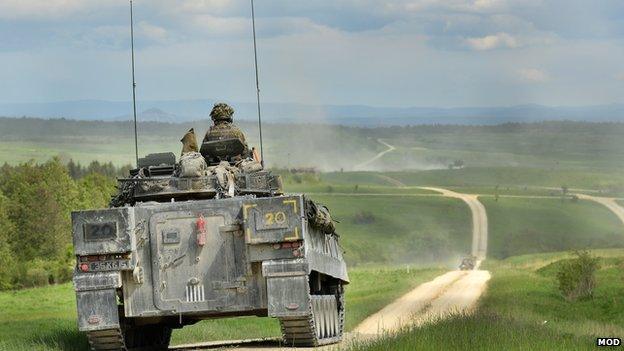
The MoD plans to take all British troops out of Germany by 2020
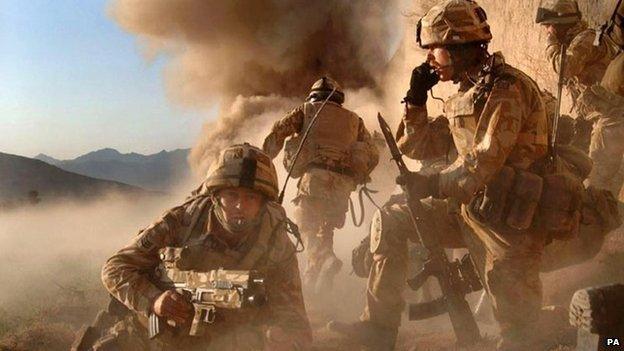
The MoD said it was "reshaping" the armed forces to ensure they were "properly equipped and more adaptable"
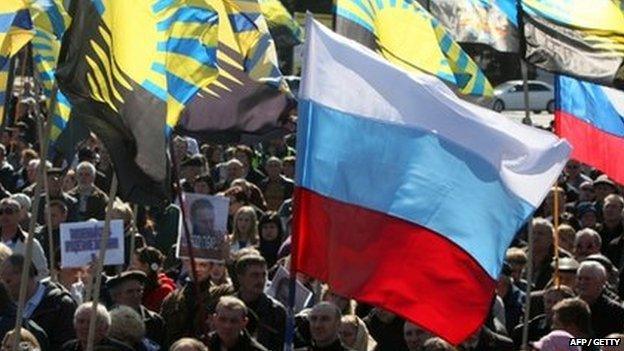
Pro-Russian protesters have been taking part in rallies in Donetsk, eastern Ukraine
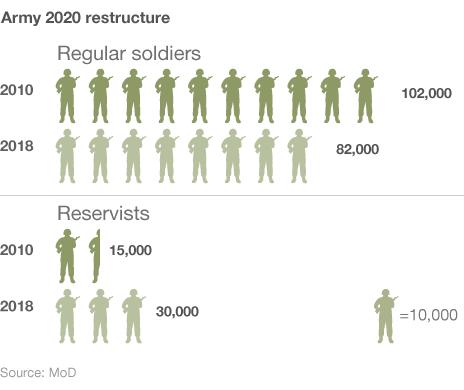
He said that recruiting troops "would send a message to Mr Putin and others that diplomacy and economic sanctions are one thing, but there is muscle behind our message".
Nato's military commander in Europe said Russian forces at the Ukrainian border were "very, very sizeable and very, very ready".
Supreme Allied Commander in Europe Gen Philip Breedlove expressed specific concerns about the threat to Moldova's Trans-Dniester region.
The build-up has been linked to Russia's annexation of Crimea from Ukraine, following the removal of Ukraine's pro-Moscow president. Russia said its forces east of Ukraine complied with international agreements.
Lord Dannatt made his comments ahead of a meeting between President Barack Obama and other world leaders in the Netherlands later, where the crisis in Crimea and Ukraine will be discussed.
'Properly equipped'
Lord Dannatt suggested the Defence Reform Bill, which is going through the House of Lords, could be the opportunity to alter the balance between regular and reserve soldiers in the Army.
Responding to the comments, Mr Cameron said: "I don't think its necessary to change our plans to base British soldiers in Britain.
"But what I think is important that we send a very clear message to our Nato partners and allies that we believe in Nato and we believe in their security."
A Ministry of Defence spokesperson said: "The 2010 Strategic Defence and Security Review set out how the armed forces would be restructured to meet future threats, including managing risks before they materialise in the UK, and maintaining a broad spectrum of defence capabilities.
"With the fourth largest defence budget in the world we are reshaping our armed forces to ensure that they are properly equipped and more adaptable to future challenges and to bring the UK into line with our closest allies, who make much more use of reserve forces."
Peter Quentin, from military think tank the Royal United Services Institute, said it was an "awkward" moment to be "seen to be reducing defence capabilities".
'Salami slicing'
He said: "These comments are not about what is happening in Crimea but in Whitehall - Lord Dannatt is using the crisis to illustrate the levels of threat and uncertainty in the international landscape and, therefore, the risks of current defence cuts.
"The Army remains particularly vulnerable to further reductions in its manpower, as the most scalable of the three services and without a clearly articulated case for why 82,000 regular troops constitutes its 'critical mass'.
"Calling for 3,000 more troops only reinforces this notion - salami slicing cuts both ways - but regardless of their numbers or capabilities it is unclear how a brigade's worth of additional troops would have a deterrent effect without the political will to deploy them.
"The public's 'war-weariness and war-wariness' has led to the disarmament of both moral and physical fighting power - there are no popular protests marching on Whitehall demanding increased defence expenditure."
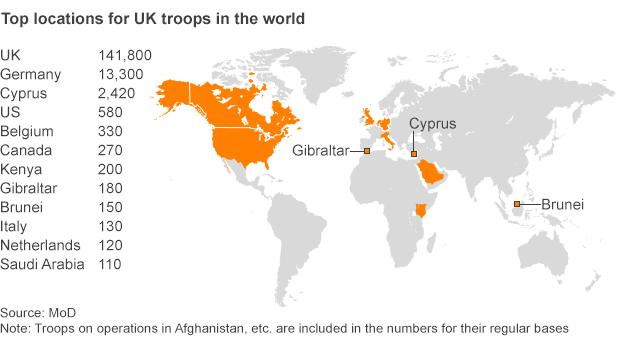
- Published24 March 2014
- Published6 March 2014
- Published24 February 2014
- Published16 January 2014